FSSAI State License
Every state in India has a unique culinary identity. Whether it’s a cozy café in the hills or a vibrant street food stall in the city, people travel across states to experience authentic regional flavors. With Ruchita Dang & Associates, your trusted company registration consultant, you can obtain your FSSAI State License smoothly.
- Personalized Consultation & Eligibility Check
- Document Preparation by Experts
- Complete Application Filing
- Timely Department Follow-Up
FSSAI State License Overview
The FSSAI State License is mandatory for food businesses operating within a single state with an annual turnover between ₹12 lakhs and ₹20 crores. With Ruchita Dang & Associates, your trusted company registration consultant, the licensing process is managed with expertise and accuracy. A company registration consultant from Ruchita Dang & Associates ensures that restaurants, cafés, hotels, canteens, manufacturers, and distributors meet all eligibility requirements for the FSSAI State License.
From eligibility checks and document drafting to online application filing and follow-ups, a company registration consultant at Ruchita Dang & Associates handles the complete procedure seamlessly. By choosing Ruchita Dang & Associates as your company registration consultant, your business gains legal compliance, consumer trust, and smooth operations under the Food Safety and Standards Act.
Role of the Food Safety and Standards Authority of India
The Food Safety and Standards Authority of India (FSSAI) plays a crucial role in regulating and monitoring food safety across the country. With Ruchita Dang & Associates, your trusted company registration consultant, businesses get proper guidance to comply with FSSAI regulations.
1. Formulating Guidelines and Norms
A company registration consultant at Ruchita Dang & Associates helps businesses follow FSSAI’s hygiene and safety norms to ensure legal compliance.
2. Launching Food Safety Awareness
The FSSAI creates nationwide awareness programs, and a company registration consultant from Ruchita Dang & Associates ensures your business aligns with these initiatives.
3. Issuing Food Licenses
Granting licenses and registration to food businesses is a key role of FSSAI, and a company registration consultant at Ruchita Dang & Associates assists you in obtaining them seamlessly.
4. Advising the Government
The FSSAI recommends new food safety policies, and with guidance from a company registration consultant at Ruchita Dang & Associates, your business stays updated.
5. Issuing Directions and Guidelines
FSSAI issues directions under the Food Safety and Standards Act, 2006, which are explained and implemented with the help of a company registration consultant from Ruchita Dang & Associates.
6. Taking Legal Action:
FSSAI initiates actions against food adulteration and malpractice, while a company registration consultant at Ruchita Dang & Associates ensures your business remains compliant and penalty-free.
Advantages of FSSAI State License
Getting an FSSAI State License isn’t just a legal formality—it brings several valuable advantages to your food business:
Builds Strong Brand Recognition
A company registration consultant at Ruchita Dang & Associates helps you secure an FSSAI State License that instantly builds trust. Customers recognize your business as committed to quality, hygiene, and safety—making you stand out in a competitive market.
Boosts Business Credibility & Creditworthiness
An FSSAI State License, managed by a company registration consultant from Ruchita Dang & Associates, enhances your professional image. Investors, banks, and partners view registered businesses as more reliable, making it easier to access loans and funding.
Attracts More Customers
With the support of a company registration consultant at Ruchita Dang & Associates, obtaining your FSSAI State License becomes simple. Licensed businesses attract more customers because consumers prefer food outlets that are registered and trustworthy, leading to higher sales and repeat buyers.
Promotes Best Practices for Food Safety
A company registration consultant from Ruchita Dang & Associates ensures your FSSAI State License promotes adherence to proper hygiene, storage, and food handling practices. This not only reduces risks but also improves overall product quality and consumer satisfaction.
Who Needs an FSSAI State License?
Businesses with a medium-sized operation in food manufacturing, processing, packaging, storage, distribution, or sales need to obtain an FSSAI State License. With Ruchita Dang & Associates, your expert company registration consultant, the process of obtaining this license becomes smooth and hassle-free. In particular, this license is required for the following categories:
Businesses operating in a single state and generating an annual turnover of more than ₹12 lakhs and less than ₹20 crores. A company registration consultant at Ruchita Dang & Associates helps verify eligibility and manage filing.
Facilities dealing with Proprietary Foods, which must comply with FSSAI safety standards. A company registration consultant from Ruchita Dang & Associates ensures proper documentation.
Vegetable oil production and processing facilities using solvent extraction and meeting the turnover criteria. A company registration consultant at Ruchita Dang & Associates ensures compliance with norms.
Hotels with a 4-star rating or below, which require the license to operate legally. A company registration consultant from Ruchita Dang & Associates handles the application.
Facilities dealing with dairy products and Milk Chilling Units with a production capacity of 500 to 50,000 litres per day. A company registration consultant at Ruchita Dang & Associates manages approvals.
Storage units with an overall capacity of less than 50,000 metric tons yearly. A company registration consultant from Ruchita Dang & Associates helps in securing the license.
Slaughterhouses handling 2–50 large animals, 10–150 small animals, or 50–1000 poultry birds per day. A company registration consultant at Ruchita Dang & Associates ensures smooth licensing.
Food processing and re-packing units with a per-day capacity between 100 kg/litre to 2 metric tons. A company registration consultant from Ruchita Dang & Associates provides end-to-end assistance.
Documents Required to Obtain FSSAI State License

Process for Obtaining FSSAI State License
To obtain an FSSAI State License from the licensing authority, follow these steps. With Ruchita Dang & Associates, your trusted company registration consultant, the process is handled efficiently and without delays:
Step 1
1. Arranging the Documents and Filing of Application via Form B
Step 2
2. Submission of Form to Licensing Authority via FoSCoS
Step 3
3. In-depth Scrutiny of Applications and Documents
Step 4
4. On-site Inspection (if required)
Step 5
5. Grant of FSSAI State License
Step 6
6. Commencement of Business Operations
Penalty for Not Complying with FSSAI's Norms
In India, penalties for Food Business Operators (FBOs) are very stringent. Non-compliance with FSSAI regulations can lead to severe consequences under the Food Safety and Standards Act, 2006. With Ruchita Dang & Associates, your trusted company registration consultant, businesses receive expert guidance to avoid these costly penalties.
FSSAI officials are authorized to conduct surprise audits of business premises without prior notice. If gaps in compliance are detected, penalties are imposed based on the severity of the violation. A company registration consultant from Ruchita Dang & Associates helps businesses stay fully compliant and penalty-free.
Penalty for Not Complying with FSSAI's Norms
| S. No. | Particulars | Fine (₹) |
|---|---|---|
| 1 | Food quality breaches the compliance given in the Act | ₹2,00,000 / Petty manufacturer – ₹25,000 |
| 2 | Sub-standard food | ₹5,00,000 |
| 3 | Misbranded food | ₹3,00,000 |
| 4 | Falsified advertisement or invalid description | ₹10,00,000 |
| 5 | Extraneous matter in food | ₹1,00,000 |
| 6 | Non-cooperation with Food Safety Officer directions | ₹2,00,000 |
| 7 | Unhygienic processing or manufacturing | ₹1,00,000 |
With the help of a company registration consultant at Ruchita Dang & Associates, food businesses can implement proper hygiene, safety, and documentation practices to avoid these penalties and maintain smooth operations.
Timeline to Obtain FSSAI State License
With the assistance of a company registration consultant from Ruchita Dang & Associates, the FSSAI State License application is filed correctly through the online FoSCoS portal or at the nearest FSSAI office.
With the assistance of a company registration consultant from Ruchita Dang & Associates, the FSSAI State License application is filed correctly through the online FoSCoS portal or at the nearest FSSAI office.
The FSSAI authority reviews your application. A company registration consultant at Ruchita Dang & Associates ensures timely responses to queries or requests for clarification to avoid delays.
If required, FSSAI officials conduct an on-site inspection. A company registration consultant from Ruchita Dang & Associates guides you in preparing facilities to meet food safety standards.
After inspection and final review, the FSSAI State License is granted. A company registration consultant at Ruchita Dang & Associates ensures you receive your license without hassle.
On average, the complete process takes between 6 to 12 weeks. With Ruchita Dang & Associates, your expert company registration consultant, timelines are met efficiently while ensuring compliance.
Eligibility Criteria for FSSAI Registration
- Make sure your facilities are clean, safe, and suitable for the size of your operations.
- Follow the basic hygiene and sanitation rules outlined in Schedule 4.
- Set up proper food safety practices based on your license type.
- If your business falls into specific categories, appoint a trained Food Safety Supervisor to oversee daily compliance.

FAQs on Filing ITR online
An FSSAI License is a mandatory certification for all food business operators in India to ensure safety, hygiene, and quality standards. A company registration consultant at Ruchita Dang & Associates helps businesses understand the different types of licenses and obtains the appropriate FSSAI License efficiently.
Medium-sized businesses operating within a single state with an annual turnover between ₹12 lakhs and ₹20 crores need a State License. A company registration consultant from Ruchita Dang & Associates evaluates eligibility, checks turnover and capacity criteria, and assists in filing the application.
Businesses with multi-state operations, e-commerce food platforms, or those involved in import/export must obtain a Central License. A company registration consultant at Ruchita Dang & Associates guides businesses through document preparation, filing, and follow-ups to ensure timely approval.
A company registration consultant at Ruchita Dang & Associates explains that an FSSAI License improves legal compliance, builds consumer trust, enhances brand credibility, attracts investors, and simplifies expansion into new markets.
Documents typically include ID proof, address proof, business registration certificates, photographs, food safety management plan, and property ownership or rental agreements. A company registration consultant from Ruchita Dang & Associates ensures all documents are accurate and complete to avoid delays.
The license can be valid for 1–5 years depending on the type of business and turnover. A company registration consultant at Ruchita Dang & Associates advises clients on selecting the most suitable validity period to optimize compliance and costs.
Renewal must be done before the license expires to avoid penalties. A company registration consultant from Ruchita Dang & Associates assists in submitting updated documents, filling renewal forms, and ensuring the process is completed smoothly
Yes, each business location requires a separate FSSAI Registration or License. A company registration consultant at Ruchita Dang & Associates helps businesses with multiple locations to obtain all necessary licenses efficiently, ensuring compliance across branches.
Non-compliance can result in penalties ranging from ₹25,000 to ₹10 lakh depending on the violation, including food adulteration, misbranding, or unhygienic practices. A company registration consultant from Ruchita Dang & Associates guides businesses in maintaining proper standards to avoid fines.
Petty retailers, hawkers, itinerant vendors, temporary stallholders, and small cottage food businesses may be exempt. A company registration consultant at Ruchita Dang & Associates reviews your business type and confirms if registration or license is mandatory.
Typically, obtaining an FSSAI License takes 6–12 weeks, including document verification, online filing, and inspection. A company registration consultant from Ruchita Dang & Associates ensures all steps are completed promptly to avoid delays.
A company registration consultant at Ruchita Dang & Associates provides end-to-end support—including eligibility assessment, document preparation, application filing, department follow-up, inspection guidance, and license renewal—ensuring a smooth, compliant, and stress-free FSSAI licensing process.


